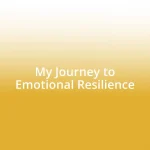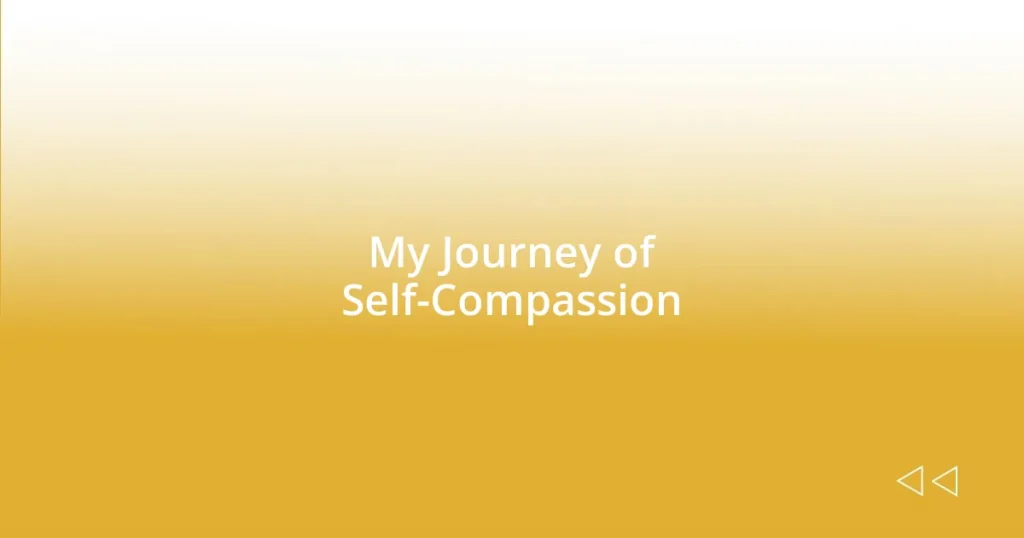Key takeaways:
- Self-compassion fosters resilience, enabling individuals to recover from setbacks without harsh self-criticism.
- Recognizing and understanding your inner critic helps differentiate negative thoughts from your true self, promoting a more compassionate mindset.
- Practicing mindfulness techniques, such as deep breathing and gratitude journaling, enhances emotional well-being and self-kindness.
- Building a supportive community and establishing consistent self-compassion practices are essential for long-term emotional health.
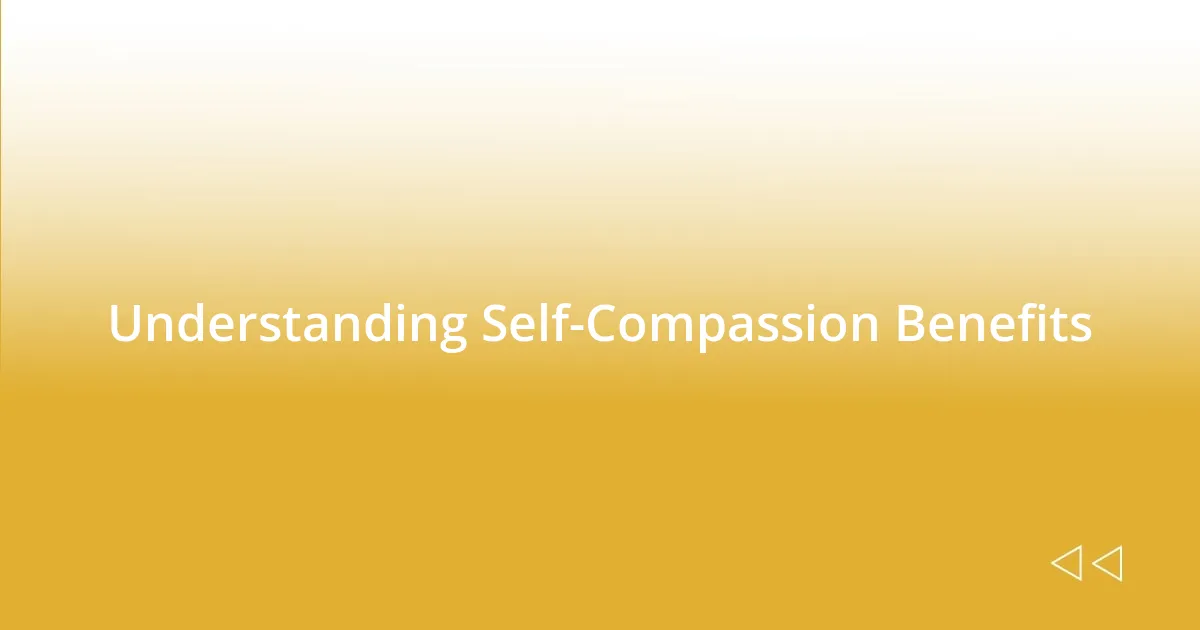
Understanding Self-Compassion Benefits
Self-compassion has this incredible ability to transform how we perceive our struggles. I remember a time when I faced a setback at work that felt devastating. Instead of being harsh on myself, I chose to acknowledge my feelings and reminded myself that everyone messes up sometimes. It was liberating to understand that failure doesn’t define who I am; it’s just a part of my journey.
One of the most profound benefits of self-compassion is its power to foster resilience. It’s like having a safety net beneath you that catches you during tough times. When you’re kind to yourself, you’re more equipped to dust off and try again. Have you ever noticed how much easier it is to bounce back when you don’t pile on guilt? I certainly found that I was able to approach my next challenge with a newfound sense of optimism.
Moreover, self-compassion enhances emotional well-being by nurturing a sense of belonging. I’ve found that reminding myself that I’m not alone in my struggles really changes the game. When I let go of perfectionism and embrace my flaws, I connect deeply with others who feel the same way. It’s like a warm hug of understanding, allowing me to foster genuine relationships while fostering acceptance of all my imperfections.
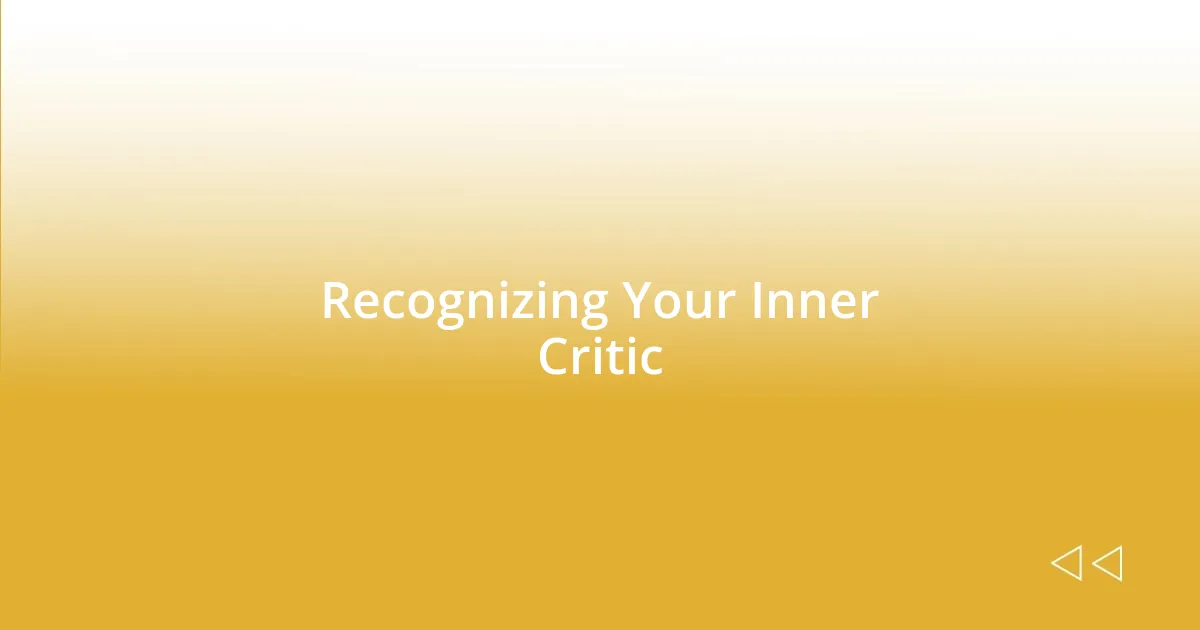
Recognizing Your Inner Critic
Recognizing your inner critic is an essential step in cultivating self-compassion. I can vividly recall the moments when my inner voice would mercilessly critique every minor mistake I made, often overshadowing my accomplishments. It’s crucial to identify those negative thoughts and remind ourselves that they don’t represent the entirety of our being; rather, they are just a discouraging whisper that tends to exaggerate our flaws.
Here are some signs that your inner critic is at play:
– Negative Self-Talk: You might catch yourself saying things like, “I’ll never be good enough” or “I always mess things up.”
– Perfectionism: You feel a compulsive need to meet exceptionally high standards, often resulting in stress or disappointment.
– Comparison: You frequently compare yourself to others and always come up short, fueling envy and frustration.
– Avoidance: You might shy away from challenges or opportunities due to fear of failure or judgment from yourself.
Acknowledging this critical voice is not just about silencing it; it’s about understanding where it comes from and why it feels so loud. For me, realizing that my inner critic often echoed past experiences helped me to weaken its power over my self-esteem. When I learned to differentiate between my inner critic and my true self, I started to build a more compassionate and understanding relationship with myself.
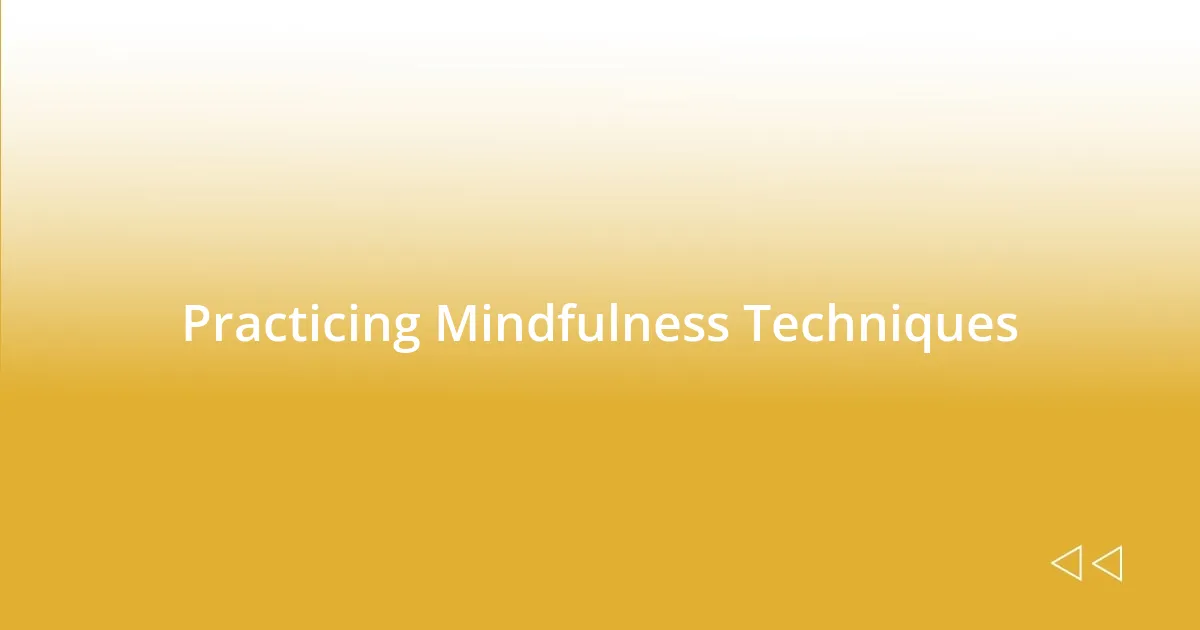
Practicing Mindfulness Techniques
Practicing mindfulness techniques has been a game-changer in my journey of self-compassion. One simple practice I adore is mindful breathing. Taking just a few moments to focus on my breath helps me reconnect with the present moment, allowing me to release the tension built up by my inner critic. I remember sitting quietly during a particularly stressful day and noticing how the simple act of inhaling deeply refreshed my perspective. Have you ever tried this? It’s amazing how just a few deep breaths can ground you.
Another powerful technique is body scan meditation. This involves lying down and paying attention to each part of your body, starting from your toes and moving up to your head. I find that when I do this, I become more aware of how stress manifests physically. For example, I once discovered that clenching my jaw was a sign of hidden anxiety. By acknowledging and releasing that tension through mindfulness, I felt lighter, both mentally and emotionally. It’s a practice that cultivates awareness and acceptance of where you are at any given moment.
Lastly, I can’t emphasize enough the value of gratitude journaling as part of my mindfulness routine. Setting aside time to jot down what I’m thankful for recalibrates my mindset. There was a time when negativity clouded my days, but writing down even the smallest blessings—like a warm cup of coffee or a friend’s supportive text—shifted my focus. When I approach my experiences with gratitude, I find it becomes much easier to extend kindness to myself. How do you embrace gratitude in your life? Even small reflections can spark significant changes.
| Mindfulness Technique | Description |
|---|---|
| Mindful Breathing | Focusing on your breath to connect with the present moment and release tension. |
| Body Scan Meditation | A technique where you systematically observe and release tension in each part of your body. |
| Gratitude Journaling | Writing down things you are thankful for to shift your mindset and foster positivity. |
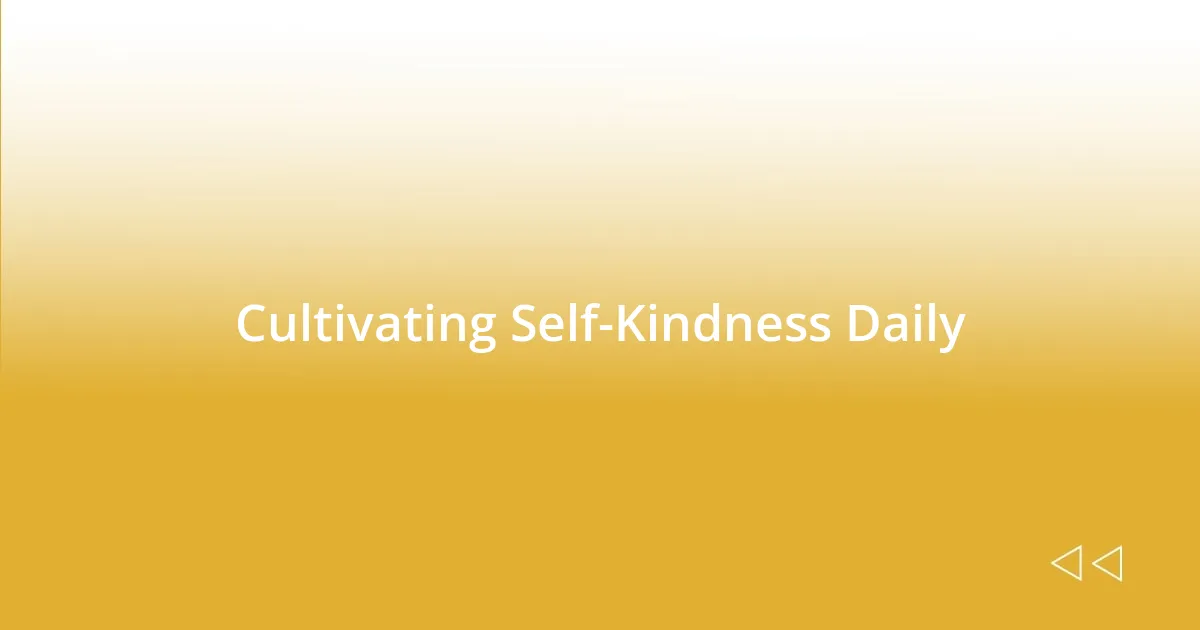
Cultivating Self-Kindness Daily
Shifting to self-kindness on a daily basis can be as simple as changing the language we use when talking to ourselves. I remember a day when I stumbled over a presentation at work. Instead of spiraling into shame, I chose to tell myself, “It’s okay. Everyone has off days.” That small shift made a world of difference. Isn’t it fascinating how a bit of kindness toward ourselves can drastically change our mood?
In my journey, I discovered the power of setting daily intentions for self-compassion. Each morning, I take a moment to declare, “Today, I will treat myself with the same kindness I offer to my friends.” On tough days, this intention acts like a protective shield against self-doubt. I often ask myself, “What would I tell a friend in my situation?” This perspective helps me extend grace to myself rather than harsh judgment.
Creating little rituals that promote self-kindness has also played a pivotal role in my life. For instance, I make a cup of herbal tea in the evenings as a symbol of self-care. As I sip, I fully embrace the moment, reflecting on my achievements rather than my failures. It’s that warm, comforting feeling that reminds me I deserve kindness, just like anyone else. Have you considered incorporating little moments into your day that bring you joy or peace? Even small gestures can create ripples of self-kindness.
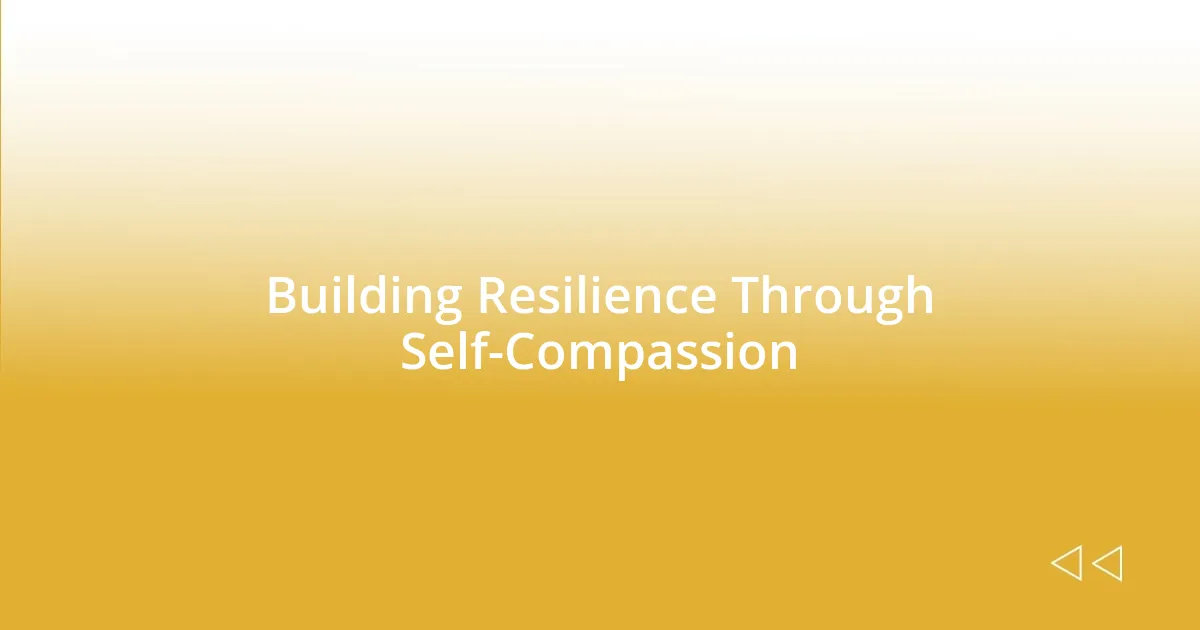
Building Resilience Through Self-Compassion
Building resilience through self-compassion has transformed how I navigate life’s challenges. I vividly remember facing a significant setback in a project I poured my heart into. Instead of letting disappointment overwhelm me, I chose to embrace it. I said to myself, “This doesn’t define my entire journey.” That mindset shift allowed me to analyze what went wrong without drowning in self-criticism. Have you ever faced a similar situation where self-compassion helped you bounce back?
I often think of resilience as a muscle that requires nurturing. When I practice self-compassion, I feel more equipped to deal with adversity. For instance, after a tough day, I treat myself to an uplifting podcast. Listening to inspiring stories reminds me that setbacks are part of growth. It’s fascinating how moments of reflection and understanding can rejuvenate our spirit and build stronger resilience. What do you do to recharge after facing challenges?
Integrating self-compassion into my daily routine creates a solid foundation for resilience. My favorite practice is to visualize a comforting figure, like a mentor or loved one, giving me a pep talk during tough times. This imagery reminds me that I’m deserving of support—both from myself and others. It’s remarkable how this simple technique can empower me to take on difficult situations with a renewed sense of strength. Have you tried nurturing your inner voice in a similar way? The solace and strength it brings are truly invaluable.
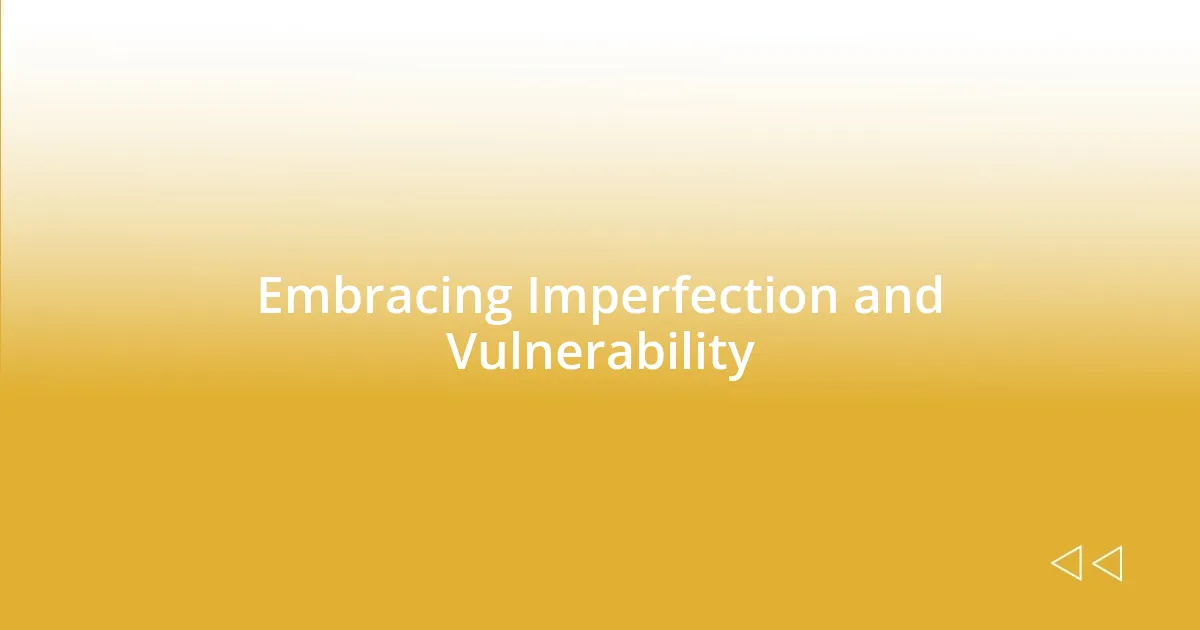
Embracing Imperfection and Vulnerability
Embracing imperfection and vulnerability is a journey that I’ve found deeply transformative. A few months ago, I shared a poem I wrote in a small group. My heart raced as I read it aloud, fearful of reactions. I remember feeling exposed and, to my surprise, the warmth of their responses embraced my vulnerability. It made me realize that sharing our imperfect selves often invites connection and understanding, reminding us that it’s okay to be seen.
I’ve also learned that vulnerability is not a weakness but a strength. One rainy afternoon, I opted to take a break instead of pushing through my work. As I curled up with a book, I reflected on my quest for perfection. That moment of unplanned self-care taught me to appreciate my flaws—those little quirks make up who I am. I often wonder how many of us hold ourselves back because we fear the judgment that may come from revealing our true selves.
In recognizing my imperfections, I’ve found freedom. Recently, I decided to experiment with cooking, knowing I might burn a dish or two. Every misstep has been a delicious lesson. It reminds me that vulnerability opens the door to growth; my mistakes in the kitchen have become cherished stories to share. When was the last time you allowed yourself to embrace an imperfect moment? Often, it’s in these moments that we discover our true selves.
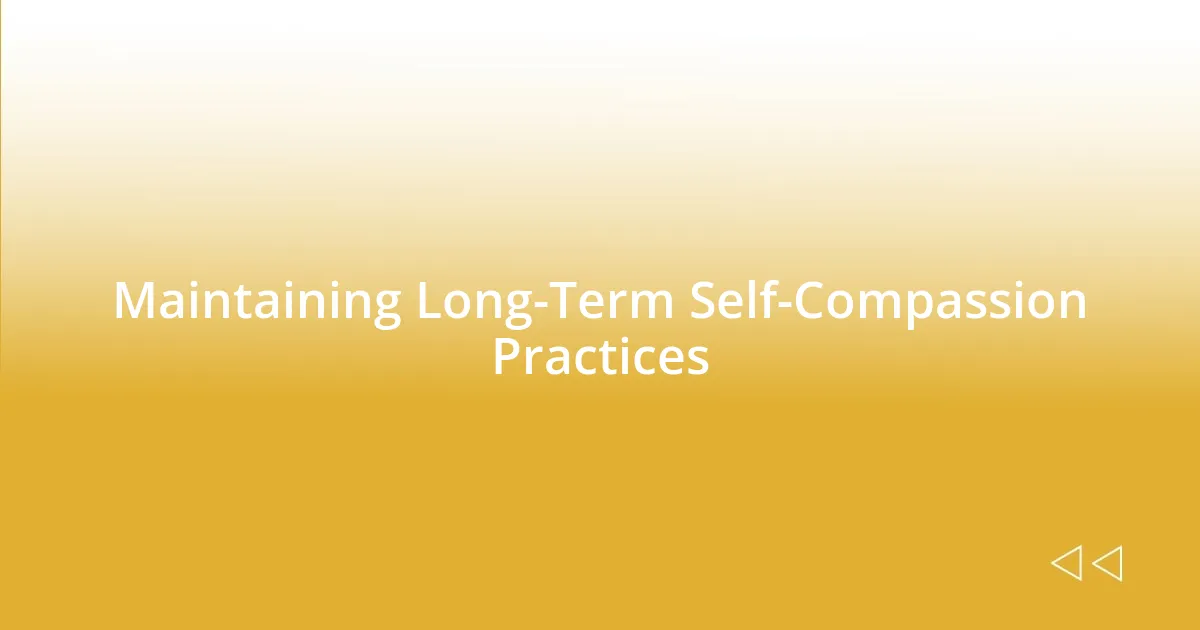
Maintaining Long-Term Self-Compassion Practices
Maintaining self-compassion over the long term is, in my experience, about establishing consistent practices that keep nurturing that inner kindness. For instance, I’ve found that journaling about my feelings helps me process challenging moments without any harsh judgment. When I look back at these entries, it’s like having a conversation with my past self, and I often ask, “How would I comfort myself in this situation?” This reflection not only strengthens my self-compassion but also deepens my understanding of my emotional landscape.
I also advocate for setting reminders throughout the day to pause and check in with myself. Whether it’s a gentle note on my phone or a sticky note on my desk, these prompts foster an awareness that I often overlook amid daily chaos. There was a time I felt overwhelmed by deadlines, and taking just a minute to breathe helped me step outside that pressure. Suddenly, the weight felt lighter, and I could approach my tasks with a more compassionate mindset—one that acknowledges feelings rather than suppresses them.
Finally, surrounding myself with supportive individuals who champion self-compassion has made a remarkable difference. Sharing my thoughts with friends who understand my journey creates a safe space for vulnerability and growth. I recall a heartfelt conversation with a friend who reminded me, “It’s okay to not be okay sometimes.” That simple affirmation reinforced my commitment to self-compassion, reminding me that I’m not alone in navigating the complexities of life. Have you found your self-compassion community? The connections we build can be incredibly powerful in maintaining our practices long-term.





